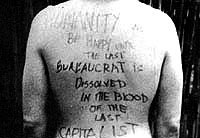|
May
27 ,
Thursday, 7:30PM
Film as
a Subversive Art IV:
Left and Revolutionary Cinema: West
Round
four of films from the book "Film as a
Subversive Art" written in 1974 by Amos
Vogel, the founder of the Cinema 16 in New York,
New York Film Festival and Lincoln Center Film
Department. The program features
"Ice"
by
Robert Kramer
(16mm, 125min, 1969)
 |
Jonathan
Rosenbaum
from the Chicago Reader: "One of American
independent Robert Kramer's strongest "underground"
features (1969), arguably his best, made in and
around New York before he resettled in Paris.
This potent and grim SF thriller about urban guerrillas
of the radical left, shot in the manner of a rough
documentary in black and white, has an epic sweep
to it. (Like many politically informed art movies
of the period, starting with Alphaville and including
even THX 1138, it was set in the future mainly
as a ruse for critiquing the present.) Now as
then, the power of this creepy movie rests largely
in its dead-on critique of the paranoia and internecine
battles that characterized revolutionary politics
during the 60s; the mood is terrorized and often
brutal, but the behavioral observations and some
of the tenderness periodically call to mind early
Cassavetes. A searing, unnerving history lesson,
it's an American counterpart to some of Jacques
Rivette's conspiracy pictures, a desperate message
found in a bottle."
Jonas
Mekas said that ' Ice ' was "the most
original and most significant American narrative
film of the late sixties.
Born
in New York in 1939, Robert Kramer ranks
as one of the most original directors of American
underground cinema. This exacting loner, the bard
of the counterculture, has worked on the fringe
both in his homeland and in France. In 1967, he
founded The Newsreel, a militant collective that
was among the first to produce films about the
Vietnam war and its impact in America. His films
constantly work at wearing away the impermeability
of documentary and fiction forms, paying special
attention to his characters. In 1969, Kramer visited
Hanoï and brought back Peoples' War.
He returned 23 years later, keen on understanding
what had become of Vietnam in the nineties - the
result was Starting Place/Point de départ.
The country was then in pieces; the old generation
had its pride intact whereas the new generation
had forgotten. Starting Place is also a
melancholic stroll among faces, objects and vestiges
that question our relationship with memory and
images. His exploration of the American heartlands
has been the other fixture of his work. Milestones
(1976) is the polyphonic evocation of a rural
community, which paints a pessimistic portrait
of American society in the seventies. In 1989,
he made Route One/USA - Route One is an
historic, now disused, road that runs down the
east coast. Through Kramer's eyes, this route
becomes the focal point that condenses American
history and its traditions of violence, blends
fiction and documentary, sets up echoes between
collective memory and private recollections. This
geographer's work evokes wars (from the Civil
War to Vietnam), confronts feminists with Christian
fundamentalists, examines the demands of minority
communities. There gradually takes forms a mosaic
of America and its history as a living organism
with a thousand facets.
|
